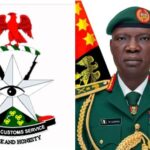A training meant to improve the efficiency of 2,000 reservists and security officers (who previously served as reservists) at various South African Police Service, has started in training academies nationwide.
Security Watch Africa reports that the reservists and security officers who were appointed as constables December 1, 2020, officially commenced their training as Constables on Monday, 12 April 2021.
According to Colonel Athlenda Mathe, who issued a statement for the South Africa Police Service (SAPS), the move to appoint and subsequently train the reservists as permanent members of the SAPS aims to bolster capacity and ensure more boots on the ground to service communities.
“ Reservists are individuals in their respective communities who voluntarily offer their services to the South African Police Service by assisting officers on the ground in crime-fighting initiatives. Prior to their appointment as reservists, they undergo a selection process that requires them to submit themselves to psychological assessments as well as physical and medical examinations as determined by the National Commissioner.
“ Successful applicants are then subjected to an in-service training programme called the Reservists Development Learning Programme which is a three phase training programme inclusive of theory, practical and tactical and firearm training. This training provides the reservist with the necessary skills to ensure that the reservist is developed in the policing field to safely and effectively perform his or her duties.
“ Part of their roles and responsibilities include performing duties within the Community Service Centre, patrols, security guard duties as well as administrative work under the supervision of a SAPS official, ” he said.
Mathe added that in line with the organizations health and safety protocols and in adhering to regulations for the containment, management and prevention of the spread of COVID-19, only 2469 reservists out of 2504 reported to the eight training academies nationwide.
“ A variety of reasons including health related matters led to some of them being turned away. To minimize the risk of transmission of COVID-19, reservists were expected to produce a medical certificate confirming that they had tested negative for COVID-19, 48 hours before they were expected to report for training. As a result, 14 reservists whose tests came back positive were not able to report for training and are currently self-isolating.
“ The decision to capacitate service points and units with reservists was taken during a Recruitment Indaba in July 2019 in Pretoria. The Indaba saw the introduction of three streams of recruitment for the organization. There are three streams inclusive of the Basic Police Learning Development Programme and the Introductory Police Learning Development Programme. ”
He said Stream one (Normal stream) consists of applicants in possession of a Senior Certificate / National Senior Certificate / National Certificate (Vocational); and or applicants who successfully completed the Military Skills Cadet Development Programme with the South African National Defence Force; and current serving Public Service Act Personnel within the SAPS.
Stream two (Graduate stream) is said to consist of applicants who have fully completed a three year National Diploma / Degree recorded on the National Learner Record Database (NLRD) or at least a NQF 6 or higher level in Law / Policing / Criminology / Law Enforcement / Forensic Investigation.
He added that Stream three (Reservist stream) consist of permanent enlistment of current active serving Reservists (*To be employed as Constables with permanent service benefits).
“ It is worth noting that the selection process for stream one and two is still on hold and applicants will be informed when this process will resume. The SAPS is confident that sufficient consultation with external role-players including organized labour has been embarked upon extensively.
“ The newly appointed Constables will undergo a four-month training programme where they will be developed in a number of fields to enable them to serve as men and women in blue. Their training programme has been tailored to build on their experience and exposure to the policing field.
“ Upon successful completion of the programme, members will be deployed to serve at stations, service points and units in their respective communities,” he said.







